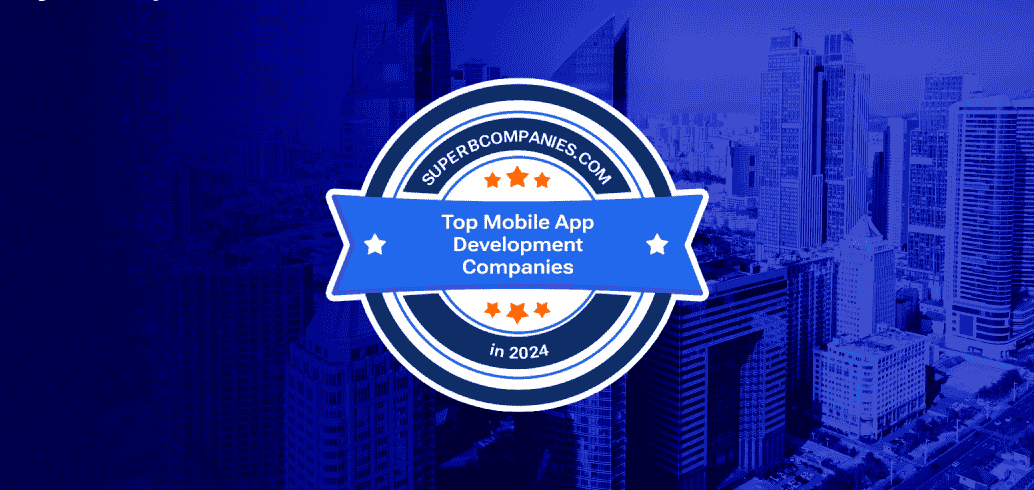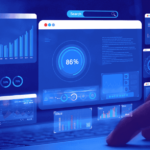Are you an entrepreneur looking to make your fitness app stand out from the competition? Chances are, data analytics can be your competitive advantage. By taking advantage of data insight and analysis, technology leaders like you can build an app that both delights customers and provides useful information.

In this blog post, we’ll explore how data analytics can empower decisions during every stage of app development – from design to launch and beyond. From discovering customer needs to identify areas for optimization – it’s all in the power of data analytics! Let’s dive in!
Importance of Data Analytics in Fitness App Development
Data analytics is an essential part of fitness app development. With analytics, fitness app developers can understand how users interact with their fitness apps, measure the progress of users’ fitness goals, and track user behavior patterns and trends.
By harnessing data analytics, fitness app developers can develop fitness apps that provide better performance and user satisfaction.
Analytics also help fitness app developers identify areas for improvement by providing insights into how users are engaging with the fitness app and any potential problems they may be experiencing while using it.
For example, data analytics tools such as heat maps can show which features within the fitness app are being used more often than others so that developers can prioritize those features in upcoming updates or focus on improving them.
Additionally, data-driven fitness app optimization can be used to identify user trends and improve fitness app performance.
Data analytics also allows fitness app developers to gain a better understanding of their target customer base so they can tailor their fitness apps specifically for them. By harnessing data analytics, fitness app developers can create tailored experiences that allow users to get the most out of the fitness apps they use.
Types of Data Collected & Analyzed From Fitness Apps
– Heart rate: this data is collected by fitness apps to measure how hard the user’s body is working while they exercise. This information can be used to customize workout plans and set goals that are appropriate for the individual’s current fitness level.
– Exercise duration: fitness apps track how long a user exercises, which helps them determine whether they need to adjust their routine or intensity to reach their desired results.
– Distance traveled: this data is often collected when running or cycling and gives users an accurate representation of their progress over time.
– Calories burned: with calorie tracking built into most fitness apps, users get a better understanding of how active they are daily and can make adjustments accordingly to reach their goals.
– Sleep data: some fitness apps also track users’ sleeping patterns and the amount of restful sleep they are getting each night, which can be valuable information in understanding how lifestyle choices impact overall health.
– Stress levels: many fitness apps measure the user’s stress levels through biofeedback sensors to provide more comprehensive insights into their physical and mental well-being. This data can be used to help create a healthier balance between work and leisure activities.
Related blogs
How can Techmango’s Data Engineering practices be leveraged to maximize data potential?
How Data Insights are Used to Customize User Experience?
– Fitness apps are increasingly using data insights to tailor users’ experiences. For example, they can use user preferences and activity history to offer personalized tips and goals.
– Some even track sleep patterns to suggest changes that can improve physical health.
– Many apps also provide recommendations on nutrition and dietary supplements based on individual needs.
– Additionally, fitness apps use data to create tailored workout programs for their users. These are specifically designed to fit their lifestyles, physical abilities, and health objectives.
– Data insights can also be used to measure progress over time and make course corrections if necessary. This helps motivate users by showing them how far they have come since beginning their journey.
– Data insights can help identify trends in user behavior and make predictions about future habits. This in turn can be used to create even more personalized experiences for users.
– All of these features allow fitness apps to provide a truly individualized experience that helps their users achieve their goals.
This kind of personalization is becoming increasingly important as people look for ways to stay active and healthy without sacrificing convenience or enjoyment. With the right data insights, fitness apps can help their users reach new heights while providing an enjoyable experience that keeps them coming back.
Strategies for Leveraging Customer Data
– Engage customers with promotional offers: Utilize customer data to deliver personalized fitness app promotions that incentivize users and encourage them to stay engaged.
– Create targeted content: Use customer data to develop fitness app content tailored specifically for individual users’ preferences, fitness goals, and interests.
– Gather feedback: Leverage customer data to understand user behavior, satisfaction levels, and how they interact with the fitness app. This information can be used to improve the overall fitness app experience.
– Analyze usage patterns: Study user activity patterns with customer data to better understand fitness goals, habits, and user engagement within the fitness app. This can help identify areas of improvement to optimize its performance.
– Share success stories: Feature fitness app user success stories to inspire and motivate others. Utilizing customer data can help to more accurately identify and target users who are the potential for positive case studies.
– Leverage social media: Create fitness app campaigns on social media that use customer data to better understand target audiences, track performance, and monitor engagement.
– Personalize the fitness journey: Use customer data to provide personalized fitness journeys for each user. This can be done by tracking fitness progress, providing tailored content and recommendations, creating customized goals, and offering rewards or incentives when needed.
– Monitor competition: Analyze customer data to keep an eye on competitors’ fitness apps in terms of features, pricing models, UX/UI design, and other aspects. This can help fitness app owners stay competitive in the market and make necessary updates or changes to optimize performance.
– Utilize data analysis: Use customer data to analyze fitness trends, preferences, usage patterns, etc. which can be used to optimize fitness app features and services to better meet user needs.
– Implement A/B testing: A/B testing is a great way to test different fitness app features with customer data before rolling them out globally. This can help fitness app owners determine the best possible solutions for their users.
– Develop an AI strategy: Leverage customer data by integrating artificial intelligence (AI) technology into fitness app design and development. AI can be used to provide personalized fitness advice, track progress, and create automated fitness plans tailored for individual users.
– Automate fitness tracking: Utilize customer data to develop fitness app features that automatically track fitness activities such as steps taken, calories burned, workouts completed, etc.
Related blogs
How to use reliable Data engineering services to drive your business growth in 2024?
Best Practices for Leveraging AI & Machine Learning in Fitness App Development
– Design fitness apps that are tailored to the user experience. Consider factors such as fitness goals, age group, physical condition, and other preferences.
– Leverage AI and machine learning to identify user needs better by tracking data points like fitness progress, calorific intake, duration of workouts, and so on. This helps create personalized fitness plans for the users.
– Incorporate features like gamification or social media integration to promote healthy competition among fitness enthusiasts. This creates an engaged community that can motivate others toward their fitness goals.
– Use AI and machine learning to track user behavior in real-time and deploy insights quickly into app designs; this ensures fitness apps are constantly being improved based on user feedback.
– Ensure appropriate security measures like Identity and access management services are in place to protect user data; fitness apps generate a lot of sensitive personal information which needs to be kept secure.
– Make sure fitness apps run smoothly and without any glitches, since users tend to abandon problematic fitness apps quickly. Leverage AI and machine learning for predictive analytics that can help detect potential issues beforehand and ensure a smooth user experience.
Bottom Line
In conclusion, fitness app development is a complicated process that requires expertise in data analytics, customer insights, and AI. The data collected from these applications can be used to customize the user experience, optimize the app and assess performance levels.
Businesses need to focus on their customer’s needs and ensure that the most up-to-date technology and practices are employed for successful fitness app development. Leveraging the right customer data and properly utilizing AI with machine learning can unlock a plethora of powerful opportunities for your business.
If you need help in developing AI-powered fitness apps, Techmango can help with our decades of experience working with businesses like yours. With us, you’ll have no trouble putting together an AI-powered fitness app that exceeds customer expectations and can maximize your profits.
Top 6 Data Engineering challenges and how Techmango overcomes them?








what an insightful article, it is true that fitness app much relied on data analytics as the user will mostly be expecting personalized recommendations which can be effectively determined by proper analytics of tracked data !!!
Thanks for this blog, its very helpful and easy to understand. Appreciate your work
Thank you for providing such an informative and well-researched blog post. I found the content to be valuable, and I appreciated the depth of analysis you offered.
I found your post to be well-structured and insightful.
This blog beautifully highlights the significant role of data analytics in fitness app development. By leveraging data, fitness apps can provide personalized experiences, track progress, and offer valuable insights. A great read that emphasizes the power of data-driven solutions in the fitness industry
I’m impressed by the level of detail you’ve covered in this post. It’s clear that you’re a subject matter expert.
Your blog article is informative and captivating, providing valuable insights in a clear and clear manner.
This article highlights the significance of data analytics in fitness app development, offering valuable insights for readers interested in leveraging data-driven approaches to enhance their fitness experiences.
Amazing Blog. thank you for sharing this information.
After reading your article I was amazed. I know that you explain it very well. And I hope that other readers will also experience how I feel after reading your article. Thanks for sharing.
I feel very grateful that I read this. It is very helpful and very informative and I really learned a lot from it.
Hi there, of course this article is truly nice and I have learned lot of things from
it about blogging. Thanks.
Thank you so much for taking your time in adding a lot of details to this content.
Thank you for taking the time to read and appreciate this article. I’m glad to hear that you found it valuable. If you’re interested in learning more about Energy & Resources analytics services, I can recommend one of the best providers in Hyderabad.
Energy & Resources analytics services
Thank you for taking the time to read and appreciate this article. I’m glad to hear that you found it valuable. If you’re interested in learning more about Energy & Resources analytics services.
Energy and resources analytics services
Interesting read! Your post offers a fresh perspective that challenges conventional thinking. Looking forward to more thought-provoking content from you.